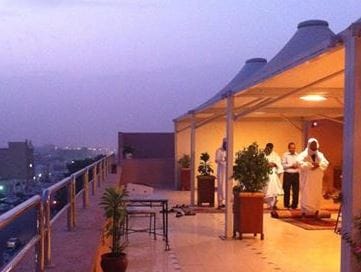The Colonnade: Becoming, Belonging

Nouakchott, 9 December 2014—My head hurts. I heard so many levels of complexity today—from the ethnic, historic and economic factors in Mali and Nigeria to the various internal conversations within Islam—that I’m almost paralyzed by the prospect of knowing more (when I don’t know anything to begin with).
But here are a couple things I do understand:
-
At the first break, the Mauritanian Sheikh I had gotten to know in Istanbul came and found me immediately: “I remember your mother and how much she loves my country. I am so happy that you are here.”
- Another Sheikh, this one from Morocco, told me: “It is so good to see you again. I am happy you are here.”
It is still a strange circumstance to be greeted as such by bearded Salafis. But it is nevertheless true, the result of a relationship rooted in respect, a respect anchored in the authenticity of acknowledging our deepest differences. And although we disagree about who Christ is, we do agree on the need to live out the common values that result from our different faith traditions: compassion, mercy, peace, justice, and love.
For example, today we had a telling conversation about the gap between “development” and “conflict resolution.” What we found from our experiences, generally speaking, was a couple things. Foremost, there was broad agreement that it was the responsibility of people of one faith to serve all the people, not just their own faith. Next, faith-based NGOs in the development world tended to fall into one of two camps. Either the NGO was “too religious” and therefore suspicious; or the “faith-based” NGO was “too secular,” with no evidence of faith in its actions, so why bother anyway? It is a hard line to walk between these two camps, within and across cultures and countries.
I shared a couple thoughts based on my experience with The Cradle Fund these past few months. First, in our own context, we had to wrestle with how to be unapologetically Christian while working for all faiths/none, precisely because of the commands of the Christian faith. I shared our summary statement—“coming alongside the suffering Church in Iraq/Syria to serve all those suffering”—and they found it totally normal.
More vital still, however, was the responsibility of the faithful to address the fundamental problem. That problem, I suggested, was that many traditions had bought into the secular paradigm, choosing to be a person of a particular nationality and/or vocation, who happens to be of a particular religion. If Islam works for peace and Christians are called to be Ambassadors of Reconciliation, however, then we must be peace-builders who happen to have particular nationalities and jobs. In my own case, I am an Ambassador of Christ who happens to be an American working for religious freedom.
Again, there was no push back. Indeed, it was taken as normal and referenced in the subsequent conversation.
So what to think of all this? I think it’s as simple as knowing who you are, and acting accordingly. Put another way, it’s an issue of identity and self-governance for individuals (as well as institutions, but that’s another conversation). These are two issues that our group, at least, does not seem to have, despite profoundly different worldviews based on irreconcilable theologies. As Nigeria’s Imam Balama said in closing today: “Let’s respect each other’s faith without compromising our own.”
And so, it is in this safe space that—paradoxically—people of different backgrounds and beliefs become, and belong to each other.
“I am so happy to see you.” “Me too.”